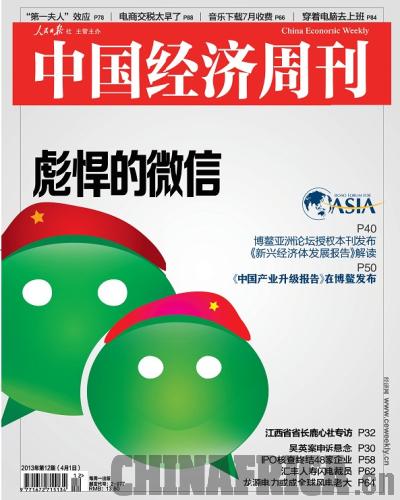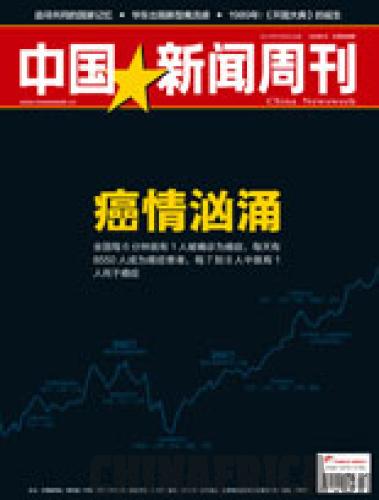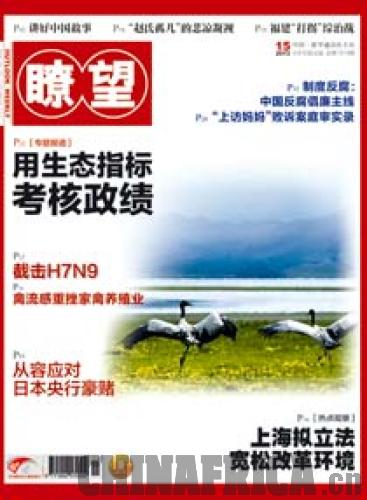| 
Mobile Revolution
China Economic Weekly
April 1, 2013
Weixin or Wechat, a free mobile chatting application developed by Chinese IT giant Tencent Holdings, has been warmly welcomed by Chinese and foreign mobile phone users, accumulating 300 million users within just two years.
China Economic Weekly in this issue looks at the success of this mobile messaging application. Tencent's QQ, a web instant messenger software, collected a large number of potential users for Wechat, a unique advantage compared with other instant messenger developers. More importantly, Wechat is free and integrates some functions of other similar software, including chatting, emailing, microblogging and online social networking.
However, the increasing popularity of Wechat is causing tensions with China's state-owned telecommunication operators, like China Mobile, China Unicom and China Telecom by threatening their profits. Some suggest that Wechat should charge its users. But experts believe charging Wechat users is not an effective solution to the problem. Operators will have to revolutionize themselves to compete.

Combating High Cancer Rates
China Newsweek
April 7, 2013
According to a National Cancer Registration Center report, incidences and mortality rates of cancer in China are increasing. Every year, 3.5 million people contract cancer while 2.5 million die of the disease. Every six minutes, a person is diagnosed with cancer and one in seven to eight people in China will succumb to the disease.
But what is truly unsettling is that the incidence of cancer has yet to reach its peak. Chen Wanqing, Deputy Director of the National Cancer Registration Center, predicts that in the next 10 years, cancer rates will continue to grow and that by 2020, 3 million people will die from the disease every year.
In 2003, the Ministry of Health released a guideline to prevent and control cancer, recognizing its registration as an important task. By 2012, a total of 222 cancer registration centers were established, covering 200 million people. However, this is only the first step in tackling the illness.
With everyone facing the risk of cancer, adequate prevention and healthy lifestyles remain the best options.
How to Curb Jaywalking
Beijing Youth Daily
April 9, 2013
On April 9, the Beijing Traffic Management Bureau announced they would roll out fresh measures to counteract jaywalking in the city. In east China's Zhejiang Province, similar policies have already been put into effect. Pedestrians ignoring red lights will be fined 5 to 20 yuan ($0.79-3.17).
But blame should not fall on pedestrians alone. "Chinese style Jaywalking" is an indicator that traffic facilities and rules need to improve. In Beijing, some red lights take too long to turn green, irking drivers. Other lights change too quickly, affording people, especially the old, too little time to cross the street.
Alongside a much-needed increase in safety awareness, correcting traffic rules to facilitate pedestrian and traffic flow remains key solution.

APPRAISING ECOLOGY
Outlook Weekly
April 15, 2013
Discussions on ecological progress have been increasingly hot and the endeavor to build a beautiful China has carried much public anticipation. However, the reality is not optimistic. With continuing economic development, the conflict between humans, resources and the environment is increasingly poignant, with air and water pollutions are frustrating the public.
One solution should be including resources consumption, environmental damage and ecological benefit into the socio-economic evaluation system. The current GDP growth-based system for officials appraisal should be abandoned, taking local ecological progress into account when evaluating their performances.
Also, ecological progress is not only a government responsibility but also one of enterprises, individual citizens and social organizations. Only when the call for low-carbon travel and resources saving is turned into everyone's concrete action, can a real beautiful China be built.
Mass Grave Threatened
Chongqing Times
April 10, 2013
During the infamous Japanese invasion of China in the 1930s and 40s, a large number of locals were slaughtered in Pipashan, west of Jinan, the capital of east China's Shandong Province, and dumped in a mass grave. A monument was later erected at the site as a reminder of the tragedy. Because of development plans, its removal has been scheduled.
In many places around China, historical and cultural heritage sites are suffering a similar fate at the hands of "urbanization." Several years ago, the Pipashan mass grave was declared a base for patriotic education, it will now have to make way for property development.
Forgetting history is a form of betrayal. A nation that chooses to ignore and ruin its heritage will not be able to achieve real revitalization. Economic growth should not be dependent on the destruction of history and culture. |